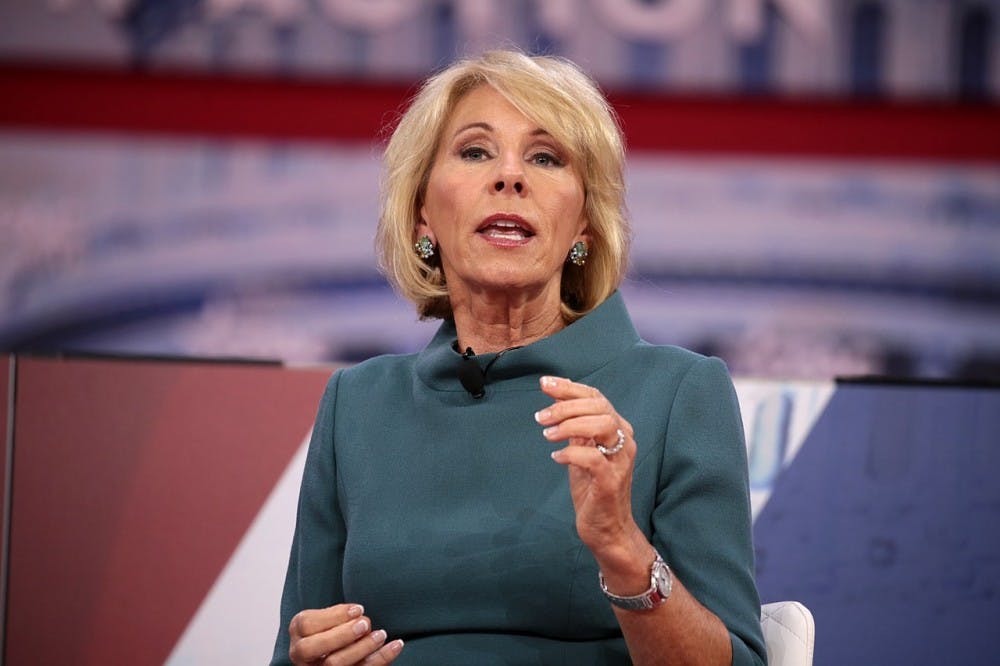Over the course of Betsy DeVos’ tenure as the Secretary of Education, the U.S. Department of Education has been thrust into a political firestorm. From the beginning of her confirmation process, DeVos made it clear that her appointment into the position would bring drastic changes to the face of American education policy. For college students particularly, DeVos’ policy changes will directly impact how sexual misconduct is handled on campus. Under her direction, it is very likely that the sexual assault violations will result in less justice for survivors.
Under the Obama administration, steps were made to reinforce Title IX policies through the Dear Colleague letter, which effectively warned universities and colleges that the federal government planned to strictly police institutions that failed to address sexual misconduct on their campuses. This advisory letter used multiple tools to strengthen Title IX, such as adjusting the standards for conviction of sexual assault from “clear and convincing” to a “preponderance of the evidence,” making it easier for universities to find guilty verdicts in misconduct cases brought to their attention. This shift in thresholds for conviction for sexual assault ignited the fiercest debates against the Obama standards.
Unfortunately, many have been ruthless in their attacks against these Obama era protections, among these are accused individuals of sexual assault and their families. Because of the reduction in jurisprudence, students accused of sexual assault and their supporters claim that old Obama standards degraded the accused’s right to due process. DeVos has responded to these concerns early under her administration, notably meeting directly with interest groups representing accused students on campus as well as more extreme coalitions, such as men’s rights organizations.
Devos’ sympathies for the accused are reflected in proposed rules for the Department of Education. In the new revisions to federal Title IX protections, DeVos greenlights more malleable standards of jurisprudence — allowing individual campuses determine the standard to which they want to judge Title IX cases and issue verdicts. These DeVos policies incentivize colleges and universities to look the other way on misconduct, crafting legal cushions for schools to overlook rampant abuse on campus. Analysts estimate under the relaxed standards there will be a significant reduction of harassment and assault cases that will be investigated compared to the previous guidelines.
While DeVos’ new policies project a sense of cruelty to survivors of sexual assault or harassment, some of the changes are grounded in reason. As many of her defenders state, removing the teeth given to Title IX during the Obama administration restores a sense of justice to the investigative process. This statement does hold water. Previously, the Office of Civil Rights, empowered through the Dear Colleague letter, took serious strides to achieve justice for victims. However, it can be argued that the OCR over incentivized guilty verdicts, leading civil courts to rule in favor of the accused students against universities’ handling of their Title IX proceedings. Regardless of the natural animosity felt toward those accused of sexual misconduct, there still needs to impartial justice system to process allegations. Through this lens, DeVos’ revamped policies seem less harmful.
But still, there are pitfalls. The Dear Colleague letter existed for a reason — the prevalence of sexual misconduct on campus is breathtaking. The pervasiveness has prompted many colleges and universities want to keep the Obama era guidelines on the books. In a recent poll of college administrators, less than one quarter of respondents plan to to rewrite regulations, in light of the DeVos rollbacks. This is a good sign that many universities may continue carrying the standard for better justice for survivors.
With the goalposts moving from colleges being penalized for “reasonably knowing” to being “deliberately indifferent” about abuse, real implications occur for survivors bringing forth their cases. Given the thorny nature of prosecuting sexual assault — where definitively proving an assault happened by a particular aggressor is notoriously difficult — every policy change for standards of guilt impacts thousands of college women’s chances to gain justice.
In this new age of institutional discretion on Title IX, the University should choose to stand with survivors. While at best the new optional guidelines attempt to protect due process of students, at worst they assist in letting both guilty parties and discriminatory universities get off scot free. The debate between survivor rights and the accused rights often take on a flavor of both-sides-ism, where the argument for justice expands to couch everyone’s point of view as valid. However, one in five women who file sexual misconduct complaints drop out of college due to their university’s refusal to pursue their claims. These numbers make it clear that as much as due process needs to be protected on campus, ensuring that survivors get their day in court is essential.
Katherine Smith is a Senior Opinion Columnist for The Cavalier Daily. She can be reached at k.smith@cavalierdaily.com.







